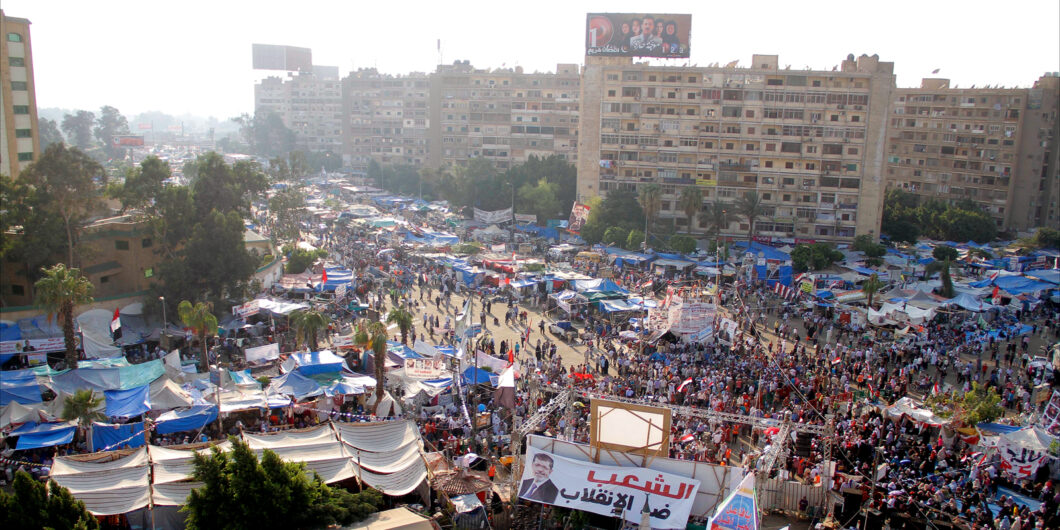Market-friendly economists, historians, and philosophers will need new approaches in an age unfriendly to economic freedom.
Democracy or Liberalism for the Middle East?
“The triumph of the West, of the Western idea, is evident,” Francis Fukuyama wrote in a now-infamous 1989 article, “in the total exhaustion of viable systematic alternatives to Western liberalism.” Perhaps no other claim in recent political memory was as swiftly proven false as this one, delivered only a matter of years before the Gulf War and the September 11 attacks. And it remains especially difficult to take seriously in 2023 in the wake of the American withdrawal from Afghanistan, the COVID-19 pandemic, and the Russian invasion of Ukraine. For Fukuyama’s part, despite taking a fair degree of grief for his claims, he has continued to write (and write well) on liberalism, such as in his 2022 book Liberalism and Its Discontents. However, the legacy of his claims about the end of history lingers in the minds of many Americans as a symbol of pre-9/11 optimism and a memory of a world that seems increasingly distant from our own.
The false notion of the “end of history” plays an important role in the background of Shadi Hamid’s 2023 book The Problem of Democracy: America, the Middle East, and the Rise and Fall of an Idea, which opens with a reflection on how the assumed triumph of liberalism heralded by the fall of the Soviet Union failed to manifest in the Middle East (or, in Hamid’s opinion, was prevented from manifesting). The very state of the Middle East since the 1990s appears to constitute a direct repudiation of Fukuyama’s earlier claims, and thus seems to require a new political solution, especially given the history of American diplomatic failure in the region throughout the succeeding decades. It is precisely in this new solution that The Problem of Democracy differs most significantly from other recent articulations of liberalism as a broader ideology, and this makes the book simultaneously intriguing and contentious.
The unique approach to liberalism and liberal democracy that Hamid undertakes in The Problem of Democracy becomes readily apparent when it is compared to how Fukuyama himself discusses the topic in his Liberalism and Its Discontents. Whereas Fukuyama begins his book by reflecting on how governments like the Orbán regime in Hungary have begun explicitly pursuing “illiberal democracy,” Hamid is concerned with the opposite approach being taken by Middle Eastern governments, which have increasingly secured the social tenets of liberalism at the direct cost of democracy (Hamid’s own Egypt and its 2013 coup loom especially large).
Hamid’s solution to this problem is what he terms “democratic minimalism,” a shift in focus away from the cultivation of social liberalism and towards the cultivation of legitimate democracy, which must be allowed to operate no matter the results. While the relative geopolitical contexts of the Balkans and the Middle East are substantially different enough to make any direct comparisons difficult, these distinctions do reveal something important about the priorities of the authors in question. Hamid is concerned throughout The Problem of Democracy to assert that democracy is worth it even when it produces “bad” outcomes, whereas Fukuyama appears to be more concerned that society maintains its liberal characteristics and rights. The Problem of Democracy opens up a critical question for discussions of modern liberalism: whether it is a philosophy of political means or a philosophy of social ends.
While both Hamid and Fukuyama recognize that the “liberalism” and “democracy” of “liberal democracy” can be split apart and discussed separately, it is important to note that neither author believes them to be entirely isolated from one another. Even Hamid, who has been maligned by some reviewers for seeming to discard liberalism out-of-hand, recognizes that, in practice, liberalism and democracy occur together. The question, then, is not whether we ought to value liberalism or democracy over and against the other but is instead a question of which we should emphasize and at what times.
These points are made especially clearly by Hamid in the eighth chapter of the book, in which he distinguishes political liberalism from social liberalism. Democracy, as Hamid understands it, necessarily includes certain aspects of liberalism, such as free speech, a free press, and so on—Hamid’s democratic minimalism is hardly a direct shortcut to a tyranny of the majority. Perhaps one might say that Hamid is “loading the dice” towards liberalism in this sense; perhaps he would even affirm it, suggesting, as he does in the book, that proper democracy will naturally cultivate liberal ends because participation in a genuine democracy has more potential to inculcate popular liberal sentiment in the long term than any top-down edict enforced by a government can offer, especially in a region where social liberalism faces such significant cultural resistance.
It is on the particular topic of social liberalism that Hamid is most open to criticism, and it is no wonder that this has been the particular point of contention some reviewers have found in The Problem of Democracy. Hamid’s democratic minimalism simply does not secure many social liberties that Western liberals have been increasingly concerned about maintaining. For instance, the legal right for Saudi Arabian women to drive (secured only in 2018), hardly seems like it would be necessary for legitimate democracy to function, and, thus, it would likely be lost if democracy was allowed to take full hold in the region as of the present. Of course, Hamid’s point is not that social liberalism is bad, but that allowing it is only good if it is secured through legitimate means. He recognizes that liberalism can be a valuable tool for an autarch to secure their own power, especially in the eyes of Western nations like the United States.
How are we to square broad liberal acceptance about the 2013 coup in Egypt with the strong reaction against the January 6 riot, especially when both are understood to be attempts to subvert a democratic election?
As good as social accomplishments like the right of women to drive in Saudi Arabia are, one is forced to wonder about the cost of such rights—is it precisely these sorts of liberal allowances that give the Saudi government the international legitimacy it requires to continue to get away with international crimes like the murder of journalist Jamal Khashoggi or the brutal war in Yemen, with no intervention from its assuaged liberal Western allies? Or, in the case of Egypt, which occupies a central place in the book, was the removal of Mohamed Morsi’s government in 2013 worth the Rabaa massacre, which killed one thousand people and injured four times that? Once again, liberalism is faced with the critical question of means and ends: is liberalism about securing a social arrangement even at great cost, or is it about establishing a system of government that might not always produce that desired arrangement?
One may wonder why Hamid does not consider social accomplishments achieved through autocratic means legitimate or secure, and the answer, for Hamid, lies in the nature of autocracy itself. Autocracy is an important theme in The Problem of Democracy, and Hamid uses it to demonstrate many of his other points on the failures of American efforts to cultivate liberalism in the Middle East. Reflecting on transitions of power in Middle Eastern and North African countries like Egypt and Algeria, Hamid argues that the apparent stability offered by autocrats is ultimately fictional, lasting only so long as the particular autocrat might last. Social liberal achievements like women’s right to drive in Saudi Arabia only exist at the whim of the country’s autocrats, and, if their regime collapses (which it inevitably will), those rights will be the first on the proverbial chopping block in the ensuing chaos.
As nice as it might be to quickly legislate such rights through autocrats, such victories are temporary and insecure in a way that would not be true if they were accomplished through the collective will of the people. The relative security afforded by legitimate democracy can be traced back to a common idea in the liberal tradition which sees society not as a collection of institutionalized edicts, but as the collective, self-determining wills of the populace; as the liberal Anglican churchman John Neville Figgis wrote over a century ago, “the force of State action is a synthesis of living wills, no mere logical theory deduced from the notion of unity.” In other words, if a society is going to genuinely institute a new principle, it can only do so through the genuine democratic expression of its populace; otherwise, any liberal victories will only be like a castle on the sand, and preserving them will necessitate more and more powerful autocrats in the future.
Critics may question whether Hamid is underestimating the ability of liberal policies to alter the minds and hearts of the populace; however, it is difficult not to see how Hamid’s arguments reflect the lived reality of many Middle Eastern and North African societies since the fall of the Soviet Union. Hamid’s suggestion of “democratic minimalism” may not work in situations like Orbán’s Hungary; in the context of the Middle East, though, a change in policy seems necessary, and democratic minimalism might offer a solution. At the very least, it provides new insight into the ideological disputes happening within Western liberalism, and introduces a fundamental question on foreign policy: What exactly are we hoping for liberalism to accomplish in the Middle East? Should we focus on producing social liberalism, even at high costs, or should we focus on establishing political liberalism, even if it produces poor results?
Such questions are hardly limited to foreign policy, either, but also reflect on our domestic understandings of liberalism and democracy. After all, how are we to square broad liberal acceptance (or, at the very least, nonchalance) about the 2013 coup in Egypt with the strong reaction against the January 6 riot, especially when both are understood to be attempts to subvert a democratic election? Of course, the ends of these events were quite different, but the similar methodology demands reflection, especially considering the much broader scope of the violence that struck Cairo in 2013 compared to Washington in 2021. Hamid’s answers to these questions may not satisfy everyone, but The Problem of Democracy is worth reading precisely because it forces the reader to consider their own answers, and to consider what exactly liberalism and liberal democracy mean to us here at the “end of history.”


